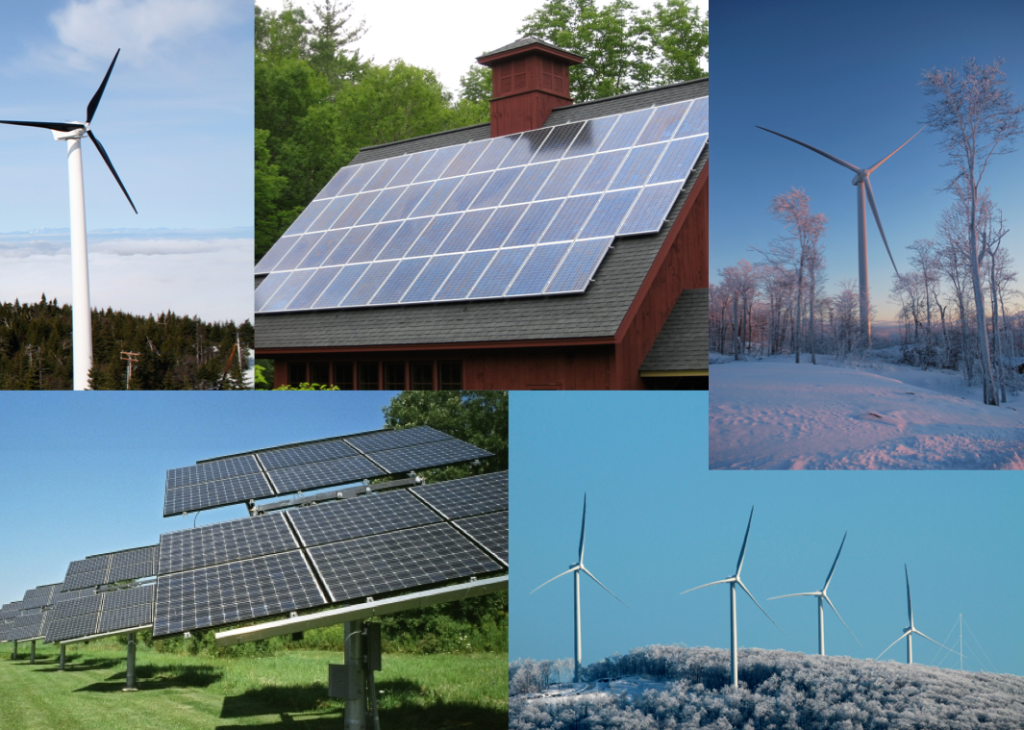Click here to add your name to the petition urging VT Senators to support clean energy and oppose S.201
Since we all use energy, we have a responsibility to generate what we can, in the most sustainable way possible, right here in Vermont. That’s VPIRG’s stance and why we oppose S.201, a bill would make it significantly harder for Vermont to transition to a clean energy future and meet the goals laid out in our state’s Comprehensive Energy Plan (CEP).
In 2011, VPIRG’s summer canvass team knocked on tens of thousands of doors around the state, encouraging Vermonters to contribute to the development of the CEP. The Public Service Department received nearly 10,000 public comments, and the message was clear: Vermonters want to take responsibility for their energy future by generating power from local, clean and renewable sources. As a result of one of the most inclusive public processes in recent memory, the state established a goal of getting 90% of our energy from renewable sources by 2050.
Despite overwhelming public support for renewables like wind and solar, opponents are now attempting to put up barriers to clean energy development in the state. Last year, a small group of senators led an effort to place a moratorium on wind power that was ultimately defeated after hundreds of Vermonters weighed in against the bill. Efforts to strangle wind development in the state simply are very unpopular with the public. The last statewide poll on the subject showed 70% of Vermonters would support a wind project in their community.
Having lost last year’s vote on a moratorium, the same group of legislators is championing a new bill, S.201, that would create obstacles to renewable energy development. It takes a somewhat different approach, but its goals are the same: prevent the state from building clean energy. In fact, here’s how the Chairman of Vermont’s Public Service Board described a version of the legislation when he testified earlier this session:
“It is my belief that it will have an impact on the rate of renewable energy development. It will slow it down. There will be fewer projects. It will be harder for projects to get through the process There will be fewer places where projects can locate easily. That will be the effect of this bill.”
~PSB Chairman James Volz, testifying before the Senate Natural Resources and Energy Committee on January 28th, 2014
VPIRG believes that S.201 remains an anti-renewable energy bill. Specific concerns about the bill include:
Bad for the environment:
- Act 250: Adjusts the role of Act 250 during Public Service Board review of energy projects in a way that – according to the Agency of Natural Resources – “could actually restrict [ANRs] ability to make broad arguments around natural resources protection to the PSB.” Furthermore, such changes “might undermine [ANR’s] ability to make arguments around protecting things like forest blocks, wildlife corridors, or preventing things like forest fragmentation.”
- GHG Emission: Elevates the weight given to most other criteria while leaving GHG emissions at the same level they are now. Thus, the bill functionally decreases the importance that regulators may give to potential greenhouse gas emissions when projects are reviewed.
- Limited Discovery: Would limit the use of discovery during the Public Service Board process. According to testimony from the Agency of Natural Resources, discovery is an incredibly important tool that is used to get information from all the parties on all sides of natural resources issues. S.201 limits discovery, which could reduce the thoroughness of the review and lead to unnecessary environmental damage in the future.
Bad Planning:
- Requires that energy projects conform to regional plans if the plans comply with weak criteria. This functionally gives regional planning commissions the capacity to block energy projects by crafting plans that don’t allow for renewable energy. S.201 also directs the Public Service Board to presume that the regional plans comply with the outlined criteria, leaving minimal oversight to ensure that plans actually contribute to state energy goals.
- Even if a Regional Plan is shown to have no rational basis or it is determined that the criteria outlined were not met when developing the plan, municipalities and regional planning commissions would still be given greater authority to block the development of renewable energy projects within their borders under S.201. The positions of the local bodies are to be given “substantial deference” by the Public Service Board, regardless of whether their plans adhere to the state’s long-term energy plan
Bad Process:
- Post-certification Review: Would prohibit the Public Service Board from employing “post-certification review” for in-state electric generation facilities. This makes it less likely that an energy project could be improved after a permit is issued. This could reduce the leverage of the Department of Public Service and the Public Service Board to require additional aesthetic mitigation.
Click here to add your name to the petition urging VT Senators to support clean energy and oppose S.201

